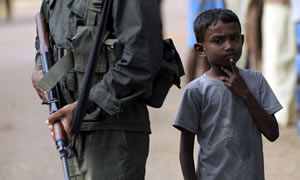Ilankai Tamil Sangam28th Year on the Web Association of Tamils of Sri Lanka in the USA |
|||||
 Home Home Archives Archives |
Sri Lanka's Tamils FreedBut future bleak for those who backed Tigersby Jason Burke, The Guardian, UK, April 5, 2010
From dawn, as noon came and went, and through the sudden downpours of mid-afternoon, the names were called out over crackling loudspeakers. Inside the Vavuniya technical college, converted since the end of the civil war in Sri Lanka last year into a holding and rehabilitation centre for detainees who played an active role in the now defeated Liberation Tigers of Tamil Eelam (LTTE), the men sat and sweated and waited. On the road outside the camp their mothers, sisters and children sat, sweated and waited too.
With each new name a man stood from the crowd within, walked or limped to the medical examination desk, then to the legal tent and then finally to the gates where his family members were waiting. Over the past 10 months the Sri Lankan government has resettled about three-quarters of the 280,000 people originally held in camps. But those who were directly involved with the separatists who fought a 26-year war for a homeland for Sri Lanka's Tamil minority have been held until now. Today 700 were allowed to leave the Vavuniya college centre and 400 were released from another camp. All were physically disabled in one way or another and, after stringent vetting, deemed no longer a threat. Many hobbled across the muddy red earth clutching cheap holdalls and prosthetics. The Sri Lankan army and government have created an extensive programme to "rehabilitate" the former LTTE cadres. In the camps most have been taught English or the rudiments of carpentry, mechanics, plumbing or basic computing. "They must learn a skill to earn a living, support their families and contribute to the development of the country," said Colonel Manuja Gunasinghe, who runs the centre. "Without money, without a job, you'll end up a criminal or a terrorist." After today's releases, around 9,000 former LTTE supporters remain in closed camps like that at Vavuniya. About 75,000 people with no link to the separatist organisation, just over 25% of the total held in the immediate aftermath of the conflict, are still in "open" camps where a system of passes permits movement. The government is banking on development to heal the divided society. At a rally in Vavuniya last week the president, Mahinda Rajapaksa, campaigning for parliamentary elections this Thursday, spoke of planned major infrastructure projects. Yet for most of those released today prospects look bleak. All of them tell tales of appalling loss and trauma. Subasharan Suriyakumar, a former conscripted LTTE fighter, said he had given himself up to soldiers last May after bringing his injured mother to a government hospital. Her wounds had been sustained as shells fell on civilians caught up with retreating LTTE fighters. Suriyakumar told the Guardian that his father and two sisters had been killed as they fled oncoming Sri Lankan military forces. Their home was destroyed in the fighting and the surrounding land was now full of mines and unexploded ordnance. Suriyakumar, 28, was therefore leaving 10 months of captivity to head to a small tent he will share with four surviving members of his family in another camp. Conditions there, in part of the complex of camps known as Menik Farms, have deteriorated recently. But returning home is impossible until the authorities declare their home village "cleared". No one knows when that might be, Suriyakumar said. Senior NGO workers in Vavuniya said they believed the government was serious about resettling those still in the camps but that much of the land once controlled by the LTTE remained mined and dangerous. Many released today headed straight to the Menik Farms camps complex. Mahandran Nagaswary, 44, had arrived at Vavuniya at dawn to wait for her son-in-law, who had lost a foot to a mine while carrying ammunition for the LTTE. He finally walked through the gates at 4pm. Nagaswary said that even if home for the family of 10 people was just a tent in an overcrowded and hot camp she was happy because "everyone would be together again". "It has been a very long time since we were all in one place," she said. Ganesh Thanushan, a 24-year-old former ammunition carrier whose left arm had been shattered a few months before the end of the fighting, said that finding his relatives was his first priority, and resuming studies interrupted by his forced recruitment by the LTTE his second. His parents and siblings are currently in camps, staying with relatives or living in the tin-roofed shacks that are springing up alongside many major roads in the former LTTE-controlled zone as tens of thousands return, sometimes decades after leaving their land and homes, clutching their release certificates, their kit of basic plastic utensils and their sacks of rice, flour or lentils. "I am not sure where all my relatives are and finding them is going to be tough but I've got to try," Thanushan said. "Being in the centre for 10 months was bearable but being separated from my family was really hard." As the sun began to sink, many in the long line of relatives outside the Vavuniya technical college began to grumble. Colonel Gunasinghe said all those due for release would be out by nightfall. "These people are our brothers. We are all Sri Lankans. We all live in one country," he said. Kumaraguru Senesta, 34, the mother of seven children, was waiting for her husband, an LTTE fighter who had been detained since surrendering 10 months ago. She held her youngest child in her arms. "It would be nice if he came out before it got dark," she said. "Then he could see his son properly. He hasn't seen him yet."
| ||||
